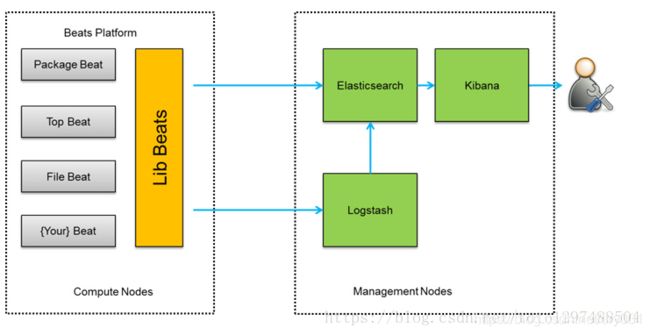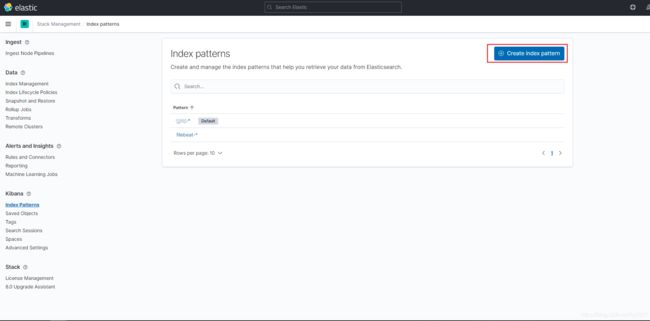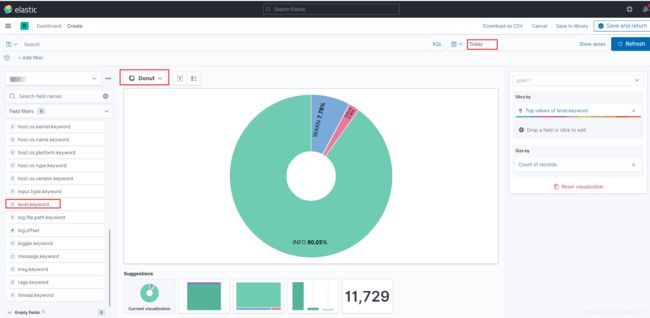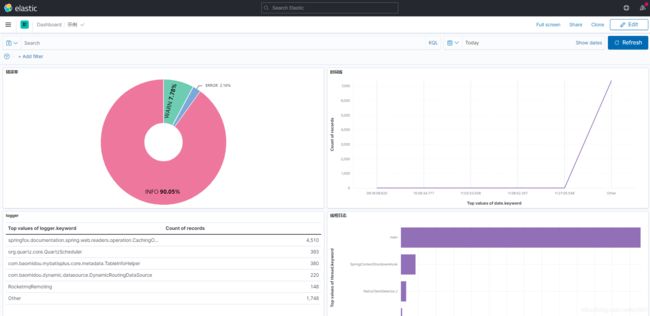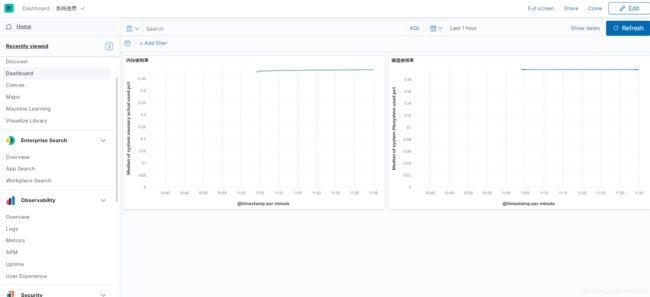CentOS 7 搭建ELK 7.13.2 环境
文章目录
- CentOS 7 搭建ELK 7.13.2 环境
-
- 一、软件清单
- 二、安装
-
- 1.安装ELK
- 2.安装插件
- 3.安装elasticsearch-head
- 4.安装filebeat (应用端)
- 5.安装metricbeat(应用端-可选)
- 三、配置
-
- 1.主机名配置
- 2.环境变量配置
- 3.配置elasticsearch
- 4.配置kibana
- 5.配置logstash
- 6.防火墙配置
- 7.开机启动
- 四、启动和关闭
-
- 1.启动和关闭elasticsearch
- 2.启动和关闭kibana
- 3.启动和关闭logstash
- 4.启动和关闭filebeat
- 5.启动和关闭filebeat
- 五、日志采集实例
-
- 1.场景介绍
- 2.logstash采集配置
- 3.filebeat采集配置
- 4.查看es索引
- 5.配置日志流
- 6.筛选日志
- 7.日志可视化
- 六、采集系统信息示例
-
- 1.修改metricbeat.yml配置文件
- 2.启用system模块
- 3.配置logstash
- 4.启动服务
- 5.可视化
- 七、x-pack安全认证
-
- 1.CA证书
- 2.修改/etc/elasticsearch/elasticsearch.yml
- 3.设置密码
- 4.elasticsearch-head配置
- 5.kibana配置
- 6.logstash配置
- 7.filebeat配置
CentOS 7 搭建ELK 7.13.2 环境
ELK 7 版本中x-pack属于内置模块,可以使用basic许可免费使用;
开源功能与订阅收费标准
一、软件清单
| 软件 | 安装路径 | 配置文件 | 端口 | 访问地址 |
|---|---|---|---|---|
| elasticsearch-7.13.2-1.x86_64 | /usr/share/elasticsearch | /etc/elasticsearch | 9200/tcp 9300/tcp | http://localhost:9200 |
| logstash-7.13.2-1.x86_64 | /usr/share/logstash | /etc/logstash | 5044/tcp 5045/tcp | |
| kibana-7.13.2-1.x86_64 | /usr/share/kibana | /etc/kibana | 5601/tcp | http://localhost:5601 |
| elasticsearch-head(可选) | /opt/elasticsearch-head | 9100/tcp | http://localhost:9100 | |
| filebeat-7.13.2-1.x86_64(应用端) | /usr/share/filebeat | /etc/filebeat | ||
| metricbeat-7.13.3-1.x86_64(应用端-可选) | /usr/share/metricbeat | /etc/metricbeat |
部署架构如下:
filebeat部署在收集节点(应用端);其余部署在管理节点。
二、安装
1.安装ELK
rpm --import https://artifacts.elastic.co/GPG-KEY-elasticsearch
cat > /etc/yum.repos.d/elastic.repo <<EOF
[elasticsearch]
name=Elasticsearch repository for 7.x packages
baseurl=https://artifacts.elastic.co/packages/7.x/yum
gpgcheck=1
gpgkey=https://artifacts.elastic.co/GPG-KEY-elasticsearch
enabled=0
autorefresh=1
type=rpm-md
[kibana-7.x]
name=Kibana repository for 7.x packages
baseurl=https://artifacts.elastic.co/packages/7.x/yum
gpgcheck=1
gpgkey=https://artifacts.elastic.co/GPG-KEY-elasticsearch
enabled=1
autorefresh=1
type=rpm-md
[logstash-7.x]
name=Elastic repository for 7.x packages
baseurl=https://artifacts.elastic.co/packages/7.x/yum
gpgcheck=1
gpgkey=https://artifacts.elastic.co/GPG-KEY-elasticsearch
enabled=1
autorefresh=1
type=rpm-md
EOF
yum --disablerepo=\* --enablerepo=elasticsearch install -y elasticsearch logstash kibana
安装包大小约1G,请耐心等待!
2.安装插件
安装插件,重启ES后生效!
- 分词插件
/usr/share/elasticsearch/bin/elasticsearch-plugin install https://github.91chifun.workers.dev/https://github.com//medcl/elasticsearch-analysis-ik/releases/download/v7.13.2/elasticsearch-analysis-ik-7.13.2.zip
- elasticsearch-head
/usr/share/elasticsearch/bin/elasticsearch-plugin install mobz/elasticsearch-head
3.安装elasticsearch-head
git clone https://github.com.cnpmjs.org/mobz/elasticsearch-head.git
cd elasticsearch-head/
npm install --unsafe-perm
npm run start
后台启动
cat > startup.sh <<EOF
nohup npm run start > /dev/null 2>&1 &
EOF
chmod u+x startup.sh
./startup.sh
4.安装filebeat (应用端)
用于系统、中间件、文件目录的文件信息,可以输出至elasticsearch或logstash中;下面会讲到使用采集log4j日志信息到logstash的示例(官方已不推荐使用log4j SocketAppender直接发送到logstash当中)。
yum --disablerepo=\* --enablerepo=elasticsearch install -y filebeat
filebeat官方文档
5.安装metricbeat(应用端-可选)
用于收集系统、中间件(MySQL、nginx、redis、zookeeper)的性能信息,例如主机的CPU、内存、磁盘、MySQL的Select、Insert数等,可以输出至elasticsearch或logstash中。
yum --disablerepo=\* --enablerepo=elasticsearch install -y metricbeat
metricbeat官方文档
参考:
Elasticsearch-head插件的安装与配置
在Centos上安装phantomjs的过程
三、配置
1.主机名配置
cat >> /etc/hosts <<EOF
192.168.1.100 node-1
EOF
2.环境变量配置
elasticsearch 依赖JDK环境,推荐使用JDK 11,可使用自己的JDK版本,也可以使用ES内置的JDK;JDK的路径通过ES_JAVA_HOME环境变量指定。
#set java environment
JAVA_HOME=/usr/java/jdk1.8.0_291-amd64
JRE_HOME=$JAVA_HOME/jre
CLASSPATH=.:$JAVA_HOME/lib/dt.jar:$JAVA_HOME/lib/tools.jar:$JRE_HOME/lib/rt.jar
PATH=$PATH:$JAVA_HOME/bin:$JRE_HOME/bin
export JAVA_HOME JRE_HOME CLASSPATH PATH
# set embedded jdk
ES_JAVA_HOME=/usr/share/elasticsearch/jdk
ES_HOME=/usr/share/elasticsearch
LOGSTASH_HOME=/usr/share/logstash
KIBANA_HOME=/usr/share/kibana
PATH=$PATH:$ES_HOME/bin:$LOGSTASH_HOME/bin:$KIBANA_HOME/bin
export ES_JAVA_HOME ES_HOME LOGSTASH_HOME KIBANA_HOME PATH
# set nodejs
PATH=$PATH:/home/soft/nodejs/bin
export PATH
3.配置elasticsearch
mkdir -p /home/data/elasticsearch/data
mkdir -p /home/data/elasticsearch/log
cd /home/data
chown elasticsearch:elasticsearch -R ./elasticsearch
vim /etc/elasticsearch/elasticsearch.yml
# ======================== Elasticsearch Configuration =========================
#
# NOTE: Elasticsearch comes with reasonable defaults for most settings.
# Before you set out to tweak and tune the configuration, make sure you
# understand what are you trying to accomplish and the consequences.
#
# The primary way of configuring a node is via this file. This template lists
# the most important settings you may want to configure for a production cluster.
#
# Please consult the documentation for further information on configuration options:
# https://www.elastic.co/guide/en/elasticsearch/reference/index.html
#
# ---------------------------------- Cluster -----------------------------------
#
# Use a descriptive name for your cluster:
#
cluster.name: my-application
#
# ------------------------------------ Node ------------------------------------
#
# Use a descriptive name for the node:
#
node.name: node-1
#
# Add custom attributes to the node:
#
#node.attr.rack: r1
#
# ----------------------------------- Paths ------------------------------------
#
# Path to directory where to store the data (separate multiple locations by comma):
#
#path.data: /var/lib/elasticsearch
path.data: /home/data/elasticsearch/data
#
# Path to log files:
#
#path.logs: /var/log/elasticsearch
path.logs: /home/data/elasticsearch/log
#
# ----------------------------------- Memory -----------------------------------
#
# Lock the memory on startup:
#
#bootstrap.memory_lock: true
#
# Make sure that the heap size is set to about half the memory available
# on the system and that the owner of the process is allowed to use this
# limit.
#
# Elasticsearch performs poorly when the system is swapping the memory.
#
# ---------------------------------- Network -----------------------------------
#
# By default Elasticsearch is only accessible on localhost. Set a different
# address here to expose this node on the network:
#
#network.host: 192.168.0.1
network.host: 0.0.0.0
#
# By default Elasticsearch listens for HTTP traffic on the first free port it
# finds starting at 9200. Set a specific HTTP port here:
#
http.port: 9200
#
# For more information, consult the network module documentation.
#
# --------------------------------- Discovery ----------------------------------
#
# Pass an initial list of hosts to perform discovery when this node is started:
# The default list of hosts is ["127.0.0.1", "[::1]"]
#
#discovery.seed_hosts: ["host1", "host2"]
discovery.seed_hosts: ["node-1"]
#
# Bootstrap the cluster using an initial set of master-eligible nodes:
#
#cluster.initial_master_nodes: ["node-1", "node-2"]
cluster.initial_master_nodes: ["node-1"]
# discovery.type: single-node
#
# For more information, consult the discovery and cluster formation module documentation.
#
# ---------------------------------- Various -----------------------------------
#
# Require explicit names when deleting indices:
#
#action.destructive_requires_name: true
http.cors.enabled: true
http.cors.allow-origin: "*"
4.配置kibana
追加以下内容
cat >> /etc/kibana/kibana.yml <i18n.locale: "zh-CN"
server.host: "0.0.0.0"
EOF
5.配置logstash
系统设置了JAVA_HOME的情况下,想使用logstash内嵌的jdk,可将以下内容放到正文的第一行。
vim /usr/share/logstash/bin/logstash.lib.sh
#use embedded jdk
unset JAVA_HOME
6.防火墙配置
firewall-cmd --zone=public --add-port=9200/tcp --permanent
firewall-cmd --zone=public --add-port=9300/tcp --permanent
firewall-cmd --zone=public --add-port=5601/tcp --permanent
firewall-cmd --zone=public --add-port=9100/tcp --permanent
firewall-cmd --zone=public --add-port=5044/tcp --permanent
firewall-cmd --zone=public --add-port=5045/tcp --permanent
firewall-cmd --reload
7.开机启动
systemctl enable elasticsearch.service
systemctl enable kibana.service
systemctl enable logstash.service
systemctl enable filebeat.service
systemctl enable metricbeat.service
四、启动和关闭
1.启动和关闭elasticsearch
systemctl start elasticsearch.service
systemctl status elasticsearch.service
systemctl stop elasticsearch.service
2.启动和关闭kibana
systemctl start kibana.service
systemctl status kibana.service
systemctl stop kibana.service
3.启动和关闭logstash
systemctl start logstash.service
systemctl status logstash.service
systemctl stop logstash.service
4.启动和关闭filebeat
systemctl start filebeat.service
systemctl status filebeat.service
systemctl stop filebeat.service
5.启动和关闭filebeat
systemctl start metricbeat.service
systemctl status metricbeat.service
systemctl stop metricbeat.service
五、日志采集实例
1.场景介绍
springboot 项目日志输出采用log4j,日志pattern配置如下,期望使用ELK实时采集各节点日志在kibana界面展示。
<Properties>
<property name="LOG_PATTERN"
value="%highlight{%date{HH:mm:ss.SSS} [%thread] %-5level %logger{36} - %msg%n}{FATAL=red, ERROR=red, WARN=yellow, INFO=cyan, DEBUG=cyan,TRACE=blue}"/>
<property name="FILE_PATH" value="log"/>
<property name="FILE_NAME" value="test"/>
Properties>
2.logstash采集配置
logstash采集配置文件放置在/etc/logstash/conf.d文件目录,logstash服务启动后,自动检测配置。
cd /etc/logstash/conf.d
cp ../logstash-sample.conf logstash-filebeat.conf
修改内容如下:
# Sample Logstash configuration for creating a simple
# Beats -> Logstash -> Elasticsearch pipeline.
input {
beats {
port => 5044
}
}
output {
elasticsearch {
hosts => ["http://localhost:9200"]
index => "test-%{+YYYY.MM.dd}"
#user => "elastic"
#password => "changeme"
}
}
systemctl restart logstash.service
netstat -ano |grep 5044
注意:5044端口在logstash服务启动60s后(通过
/var/log/logstash日志打印时间确定为60s),才可查看到的!也就是说,logstash至少在启动1分钟后,才可正常工作!
啥情况啊,知道的可以留言,我是没找到在哪配置?
3.filebeat采集配置
修改
/etc/filebeat/filebeat.yml配置文件
Filebeat inputs属性组:enabled: true /home/logs/test*.log
Elasticsearch Output属性组:#hosts: [“localhost:9200”]
Elasticsearch Output属性组:hosts: [“localhost:5044”]
Kibana 属性组:host: “localhost:5601”
###################### Filebeat Configuration Example #########################
# This file is an example configuration file highlighting only the most common
# options. The filebeat.reference.yml file from the same directory contains all the
# supported options with more comments. You can use it as a reference.
#
# You can find the full configuration reference here:
# https://www.elastic.co/guide/en/beats/filebeat/index.html
# For more available modules and options, please see the filebeat.reference.yml sample
# configuration file.
# ============================== Filebeat inputs ===============================
filebeat.inputs:
# Each - is an input. Most options can be set at the input level, so
# you can use different inputs for various configurations.
# Below are the input specific configurations.
- type: log
# Change to true to enable this input configuration.
enabled: true
# Paths that should be crawled and fetched. Glob based paths.
paths:
#- /var/log/*.log
- /home/logs/test*.log
#- c:\programdata\elasticsearch\logs\*
# Exclude lines. A list of regular expressions to match. It drops the lines that are
# matching any regular expression from the list.
#exclude_lines: ['^DBG']
# Include lines. A list of regular expressions to match. It exports the lines that are
# matching any regular expression from the list.
#include_lines: ['^ERR', '^WARN']
# Exclude files. A list of regular expressions to match. Filebeat drops the files that
# are matching any regular expression from the list. By default, no files are dropped.
#exclude_files: ['.gz$']
# 过滤行
include_lines: ['INFO', 'WARN', 'ERROR', 'FATAL']
exclude_lines: ['TRACE', 'DEBUG']
# 匹配多行作为一个完整的event
multiline.pattern: '^[0-9]{2}:[0-9]{2}:[0-9]{2}\.[0-9]{3}'
# 拼接时机 true 匹配失败时 false 匹配成功时
multiline.negate: true
# after 拼接到上一行结尾 before 拼接到下一行开头
multiline.match: after
# Optional additional fields. These fields can be freely picked
# to add additional information to the crawled log files for filtering
#fields:
# level: debug
# review: 1
### Multiline options
# Multiline can be used for log messages spanning multiple lines. This is common
# for Java Stack Traces or C-Line Continuation
# The regexp Pattern that has to be matched. The example pattern matches all lines starting with [
#multiline.pattern: ^\[
# Defines if the pattern set under pattern should be negated or not. Default is false.
#multiline.negate: false
# Match can be set to "after" or "before". It is used to define if lines should be append to a pattern
# that was (not) matched before or after or as long as a pattern is not matched based on negate.
# Note: After is the equivalent to previous and before is the equivalent to to next in Logstash
#multiline.match: after
# filestream is an experimental input. It is going to replace log input in the future.
- type: filestream
# Change to true to enable this input configuration.
enabled: false
# Paths that should be crawled and fetched. Glob based paths.
paths:
- /var/log/*.log
#- c:\programdata\elasticsearch\logs\*
# Exclude lines. A list of regular expressions to match. It drops the lines that are
# matching any regular expression from the list.
#exclude_lines: ['^DBG']
# Include lines. A list of regular expressions to match. It exports the lines that are
# matching any regular expression from the list.
#include_lines: ['^ERR', '^WARN']
# Exclude files. A list of regular expressions to match. Filebeat drops the files that
# are matching any regular expression from the list. By default, no files are dropped.
#prospector.scanner.exclude_files: ['.gz$']
# Optional additional fields. These fields can be freely picked
# to add additional information to the crawled log files for filtering
#fields:
# level: debug
# review: 1
# ============================== Filebeat modules ==============================
filebeat.config.modules:
# Glob pattern for configuration loading
path: ${path.config}/modules.d/*.yml
# Set to true to enable config reloading
reload.enabled: false
# Period on which files under path should be checked for changes
#reload.period: 10s
# ======================= Elasticsearch template setting =======================
setup.template.settings:
index.number_of_shards: 1
#index.codec: best_compression
#_source.enabled: false
# ================================== General ===================================
# The name of the shipper that publishes the network data. It can be used to group
# all the transactions sent by a single shipper in the web interface.
#name:
# The tags of the shipper are included in their own field with each
# transaction published.
#tags: ["service-X", "web-tier"]
# Optional fields that you can specify to add additional information to the
# output.
#fields:
# env: staging
# ================================= Dashboards =================================
# These settings control loading the sample dashboards to the Kibana index. Loading
# the dashboards is disabled by default and can be enabled either by setting the
# options here or by using the `setup` command.
#setup.dashboards.enabled: false
# The URL from where to download the dashboards archive. By default this URL
# has a value which is computed based on the Beat name and version. For released
# versions, this URL points to the dashboard archive on the artifacts.elastic.co
# website.
#setup.dashboards.url:
# =================================== Kibana ===================================
# Starting with Beats version 6.0.0, the dashboards are loaded via the Kibana API.
# This requires a Kibana endpoint configuration.
setup.kibana:
# Kibana Host
# Scheme and port can be left out and will be set to the default (http and 5601)
# In case you specify and additional path, the scheme is required: http://localhost:5601/path
# IPv6 addresses should always be defined as: https://[2001:db8::1]:5601
host: "localhost:5601"
# Kibana Space ID
# ID of the Kibana Space into which the dashboards should be loaded. By default,
# the Default Space will be used.
#space.id:
# =============================== Elastic Cloud ================================
# These settings simplify using Filebeat with the Elastic Cloud (https://cloud.elastic.co/).
# The cloud.id setting overwrites the `output.elasticsearch.hosts` and
# `setup.kibana.host` options.
# You can find the `cloud.id` in the Elastic Cloud web UI.
#cloud.id:
# The cloud.auth setting overwrites the `output.elasticsearch.username` and
# `output.elasticsearch.password` settings. The format is `:`.
#cloud.auth:
# ================================== Outputs ===================================
# Configure what output to use when sending the data collected by the beat.
# ---------------------------- Elasticsearch Output ----------------------------
#output.elasticsearch:
# Array of hosts to connect to.
#hosts: ["localhost:9200"]
# Protocol - either `http` (default) or `https`.
#protocol: "https"
# Authentication credentials - either API key or username/password.
#api_key: "id:api_key"
#username: "elastic"
#password: "changeme"
# ------------------------------ Logstash Output -------------------------------
output.logstash:
# The Logstash hosts
hosts: ["localhost:5044"]
# Optional SSL. By default is off.
# List of root certificates for HTTPS server verifications
#ssl.certificate_authorities: ["/etc/pki/root/ca.pem"]
# Certificate for SSL client authentication
#ssl.certificate: "/etc/pki/client/cert.pem"
# Client Certificate Key
#ssl.key: "/etc/pki/client/cert.key"
# ================================= Processors =================================
processors:
- add_host_metadata:
when.not.contains.tags: forwarded
- add_cloud_metadata: ~
- add_docker_metadata: ~
- add_kubernetes_metadata: ~
# ================================== Logging ===================================
# Sets log level. The default log level is info.
# Available log levels are: error, warning, info, debug
#logging.level: debug
# At debug level, you can selectively enable logging only for some components.
# To enable all selectors use ["*"]. Examples of other selectors are "beat",
# "publisher", "service".
#logging.selectors: ["*"]
# ============================= X-Pack Monitoring ==============================
# Filebeat can export internal metrics to a central Elasticsearch monitoring
# cluster. This requires xpack monitoring to be enabled in Elasticsearch. The
# reporting is disabled by default.
# Set to true to enable the monitoring reporter.
#monitoring.enabled: false
# Sets the UUID of the Elasticsearch cluster under which monitoring data for this
# Filebeat instance will appear in the Stack Monitoring UI. If output.elasticsearch
# is enabled, the UUID is derived from the Elasticsearch cluster referenced by output.elasticsearch.
#monitoring.cluster_uuid:
# Uncomment to send the metrics to Elasticsearch. Most settings from the
# Elasticsearch output are accepted here as well.
# Note that the settings should point to your Elasticsearch *monitoring* cluster.
# Any setting that is not set is automatically inherited from the Elasticsearch
# output configuration, so if you have the Elasticsearch output configured such
# that it is pointing to your Elasticsearch monitoring cluster, you can simply
# uncomment the following line.
#monitoring.elasticsearch:
# ============================== Instrumentation ===============================
# Instrumentation support for the filebeat.
#instrumentation:
# Set to true to enable instrumentation of filebeat.
#enabled: false
# Environment in which filebeat is running on (eg: staging, production, etc.)
#environment: ""
# APM Server hosts to report instrumentation results to.
#hosts:
# - http://localhost:8200
# API Key for the APM Server(s).
# If api_key is set then secret_token will be ignored.
#api_key:
# Secret token for the APM Server(s).
#secret_token:
# ================================= Migration ==================================
# This allows to enable 6.7 migration aliases
#migration.6_to_7.enabled: true
4.查看es索引
5.配置日志流
- 调试grok pattern
对应日志行,我们根据需要可以分割成多个字段,方便查找;分割操作使用logstash的filter plugin
%{TIME:date} \[%{WORD:thread}]\ %{LOGLEVEL:level} %{SPACE}%{JAVACLASS:logger} %{GREEDYDATA:msg}
其中TIME、WORD、LOGLEVEL等为logstash grok预定义的正则匹配模式(默认位于/usr/share/logstash/vendor/bundle/jruby/2.5.0/gems/logstash-patterns-core-4.3.1/patterns/legacy);
也可以自定义pattern并在grok中指定目录,例如
filter {
grok {
patterns_dir => ["./patterns"]
match => { "message" => "%{SYSLOGBASE} %{POSTFIX_QUEUEID:queue_id}: %{GREEDYDATA:syslog_message}" }
}
}
- 修改
/etc/logstash/conf.d/logstash-filebeat.conf
# Sample Logstash configuration for creating a simple
# Beats -> Logstash -> Elasticsearch pipeline.
input {
beats {
port => 5044
}
}
filter {
grok {
match => { "message" => "%{TIME:date} \[%{WORD:thread}]\ %{LOGLEVEL:level} %{SPACE}%{JAVACLASS:logger} %{GREEDYDATA:msg}" }
}
}
output {
elasticsearch {
hosts => ["http://localhost:9200"]
index => "gpsj-%{+YYYY.MM.dd}"
#user => "elastic"
#password => "changeme"
}
}
systemctl restart logstash.service
- 创建index pattern
6.筛选日志
通过logstash grok插件分割的字段(date、thread、level、logger、msg)筛选日志
7.日志可视化
六、采集系统信息示例
1.修改metricbeat.yml配置文件
vim /etc/metricbeat/metricbeat.yml
主要修改内容:禁用Elasticsearch Output,启用Logstash Output并修改端口号为5045
###################### Metricbeat Configuration Example #######################
# This file is an example configuration file highlighting only the most common
# options. The metricbeat.reference.yml file from the same directory contains all the
# supported options with more comments. You can use it as a reference.
#
# You can find the full configuration reference here:
# https://www.elastic.co/guide/en/beats/metricbeat/index.html
# =========================== Modules configuration ============================
metricbeat.config.modules:
# Glob pattern for configuration loading
path: ${path.config}/modules.d/*.yml
# Set to true to enable config reloading
reload.enabled: false
# Period on which files under path should be checked for changes
#reload.period: 10s
# ======================= Elasticsearch template setting =======================
setup.template.settings:
index.number_of_shards: 1
index.codec: best_compression
#_source.enabled: false
# ================================== General ===================================
# The name of the shipper that publishes the network data. It can be used to group
# all the transactions sent by a single shipper in the web interface.
#name:
# The tags of the shipper are included in their own field with each
# transaction published.
#tags: ["service-X", "web-tier"]
# Optional fields that you can specify to add additional information to the
# output.
#fields:
# env: staging
# ================================= Dashboards =================================
# These settings control loading the sample dashboards to the Kibana index. Loading
# the dashboards is disabled by default and can be enabled either by setting the
# options here or by using the `setup` command.
#setup.dashboards.enabled: false
# The URL from where to download the dashboards archive. By default this URL
# has a value which is computed based on the Beat name and version. For released
# versions, this URL points to the dashboard archive on the artifacts.elastic.co
# website.
#setup.dashboards.url:
# =================================== Kibana ===================================
# Starting with Beats version 6.0.0, the dashboards are loaded via the Kibana API.
# This requires a Kibana endpoint configuration.
setup.kibana:
# Kibana Host
# Scheme and port can be left out and will be set to the default (http and 5601)
# In case you specify and additional path, the scheme is required: http://localhost:5601/path
# IPv6 addresses should always be defined as: https://[2001:db8::1]:5601
#host: "localhost:5601"
# Kibana Space ID
# ID of the Kibana Space into which the dashboards should be loaded. By default,
# the Default Space will be used.
#space.id:
# =============================== Elastic Cloud ================================
# These settings simplify using Metricbeat with the Elastic Cloud (https://cloud.elastic.co/).
# The cloud.id setting overwrites the `output.elasticsearch.hosts` and
# `setup.kibana.host` options.
# You can find the `cloud.id` in the Elastic Cloud web UI.
#cloud.id:
# The cloud.auth setting overwrites the `output.elasticsearch.username` and
# `output.elasticsearch.password` settings. The format is `:`.
#cloud.auth:
# ================================== Outputs ===================================
# Configure what output to use when sending the data collected by the beat.
# ---------------------------- Elasticsearch Output ----------------------------
output.elasticsearch:
# Array of hosts to connect to.
hosts: ["localhost:9200"]
# Protocol - either `http` (default) or `https`.
#protocol: "https"
# Authentication credentials - either API key or username/password.
#api_key: "id:api_key"
#username: "elastic"
#password: "changeme"
# ------------------------------ Logstash Output -------------------------------
#output.logstash:
# The Logstash hosts
#hosts: ["localhost:5044"]
# Optional SSL. By default is off.
# List of root certificates for HTTPS server verifications
#ssl.certificate_authorities: ["/etc/pki/root/ca.pem"]
# Certificate for SSL client authentication
#ssl.certificate: "/etc/pki/client/cert.pem"
# Client Certificate Key
#ssl.key: "/etc/pki/client/cert.key"
# ================================= Processors =================================
# Configure processors to enhance or manipulate events generated by the beat.
processors:
- add_host_metadata: ~
- add_cloud_metadata: ~
- add_docker_metadata: ~
- add_kubernetes_metadata: ~
# ================================== Logging ===================================
# Sets log level. The default log level is info.
# Available log levels are: error, warning, info, debug
#logging.level: debug
# At debug level, you can selectively enable logging only for some components.
# To enable all selectors use ["*"]. Examples of other selectors are "beat",
# "publisher", "service".
#logging.selectors: ["*"]
# ============================= X-Pack Monitoring ==============================
# Metricbeat can export internal metrics to a central Elasticsearch monitoring
# cluster. This requires xpack monitoring to be enabled in Elasticsearch. The
# reporting is disabled by default.
# Set to true to enable the monitoring reporter.
#monitoring.enabled: false
# Sets the UUID of the Elasticsearch cluster under which monitoring data for this
# Metricbeat instance will appear in the Stack Monitoring UI. If output.elasticsearch
# is enabled, the UUID is derived from the Elasticsearch cluster referenced by output.elasticsearch.
#monitoring.cluster_uuid:
# Uncomment to send the metrics to Elasticsearch. Most settings from the
# Elasticsearch output are accepted here as well.
# Note that the settings should point to your Elasticsearch *monitoring* cluster.
# Any setting that is not set is automatically inherited from the Elasticsearch
# output configuration, so if you have the Elasticsearch output configured such
# that it is pointing to your Elasticsearch monitoring cluster, you can simply
# uncomment the following line.
#monitoring.elasticsearch:
# ============================== Instrumentation ===============================
# Instrumentation support for the metricbeat.
#instrumentation:
# Set to true to enable instrumentation of metricbeat.
#enabled: false
# Environment in which metricbeat is running on (eg: staging, production, etc.)
#environment: ""
# APM Server hosts to report instrumentation results to.
#hosts:
# - http://localhost:8200
# API Key for the APM Server(s).
# If api_key is set then secret_token will be ignored.
#api_key:
# Secret token for the APM Server(s).
#secret_token:
# ================================= Migration ==================================
# This allows to enable 6.7 migration aliases
#migration.6_to_7.enabled: true
[root@node-1 metricbeat]# systemctl enable metricbeat.service
Created symlink from /etc/systemd/system/multi-user.target.wants/metricbeat.service to /usr/lib/systemd/system/metricbeat.service.
[root@node-1 metricbeat]# systemctl list-unit-files |grep metricbeat
metricbeat.service enabled
[root@node-1 metricbeat]# ls
fields.yml metricbeat.reference.yml metricbeat.yml modules.d
[root@node-1 metricbeat]# vim metricbeat.yml
[root@node-1 metricbeat]# cat metricbeat.
cat: metricbeat.: 没有那个文件或目录
[root@node-1 metricbeat]# cat metricbeat.yml
###################### Metricbeat Configuration Example #######################
# This file is an example configuration file highlighting only the most common
# options. The metricbeat.reference.yml file from the same directory contains all the
# supported options with more comments. You can use it as a reference.
#
# You can find the full configuration reference here:
# https://www.elastic.co/guide/en/beats/metricbeat/index.html
# =========================== Modules configuration ============================
metricbeat.config.modules:
# Glob pattern for configuration loading
path: ${path.config}/modules.d/*.yml
# Set to true to enable config reloading
reload.enabled: false
# Period on which files under path should be checked for changes
#reload.period: 10s
# ======================= Elasticsearch template setting =======================
setup.template.settings:
index.number_of_shards: 1
index.codec: best_compression
#_source.enabled: false
# ================================== General ===================================
# The name of the shipper that publishes the network data. It can be used to group
# all the transactions sent by a single shipper in the web interface.
#name:
# The tags of the shipper are included in their own field with each
# transaction published.
#tags: ["service-X", "web-tier"]
# Optional fields that you can specify to add additional information to the
# output.
#fields:
# env: staging
# ================================= Dashboards =================================
# These settings control loading the sample dashboards to the Kibana index. Loading
# the dashboards is disabled by default and can be enabled either by setting the
# options here or by using the `setup` command.
#setup.dashboards.enabled: false
# The URL from where to download the dashboards archive. By default this URL
# has a value which is computed based on the Beat name and version. For released
# versions, this URL points to the dashboard archive on the artifacts.elastic.co
# website.
#setup.dashboards.url:
# =================================== Kibana ===================================
# Starting with Beats version 6.0.0, the dashboards are loaded via the Kibana API.
# This requires a Kibana endpoint configuration.
setup.kibana:
# Kibana Host
# Scheme and port can be left out and will be set to the default (http and 5601)
# In case you specify and additional path, the scheme is required: http://localhost:5601/path
# IPv6 addresses should always be defined as: https://[2001:db8::1]:5601
host: "localhost:5601"
# Kibana Space ID
# ID of the Kibana Space into which the dashboards should be loaded. By default,
# the Default Space will be used.
#space.id:
# =============================== Elastic Cloud ================================
# These settings simplify using Metricbeat with the Elastic Cloud (https://cloud.elastic.co/).
# The cloud.id setting overwrites the `output.elasticsearch.hosts` and
# `setup.kibana.host` options.
# You can find the `cloud.id` in the Elastic Cloud web UI.
#cloud.id:
# The cloud.auth setting overwrites the `output.elasticsearch.username` and
# `output.elasticsearch.password` settings. The format is `:`.
#cloud.auth:
# ================================== Outputs ===================================
# Configure what output to use when sending the data collected by the beat.
# ---------------------------- Elasticsearch Output ----------------------------
#output.elasticsearch:
# Array of hosts to connect to.
# hosts: ["localhost:9200"]
# Protocol - either `http` (default) or `https`.
#protocol: "https"
# Authentication credentials - either API key or username/password.
#api_key: "id:api_key"
#username: "elastic"
#password: "changeme"
# ------------------------------ Logstash Output -------------------------------
output.logstash:
# The Logstash hosts
hosts: ["localhost:5045"]
# Optional SSL. By default is off.
# List of root certificates for HTTPS server verifications
#ssl.certificate_authorities: ["/etc/pki/root/ca.pem"]
# Certificate for SSL client authentication
#ssl.certificate: "/etc/pki/client/cert.pem"
# Client Certificate Key
#ssl.key: "/etc/pki/client/cert.key"
# ================================= Processors =================================
# Configure processors to enhance or manipulate events generated by the beat.
processors:
- add_host_metadata: ~
- add_cloud_metadata: ~
- add_docker_metadata: ~
- add_kubernetes_metadata: ~
# ================================== Logging ===================================
# Sets log level. The default log level is info.
# Available log levels are: error, warning, info, debug
#logging.level: debug
# At debug level, you can selectively enable logging only for some components.
# To enable all selectors use ["*"]. Examples of other selectors are "beat",
# "publisher", "service".
#logging.selectors: ["*"]
# ============================= X-Pack Monitoring ==============================
# Metricbeat can export internal metrics to a central Elasticsearch monitoring
# cluster. This requires xpack monitoring to be enabled in Elasticsearch. The
# reporting is disabled by default.
# Set to true to enable the monitoring reporter.
#monitoring.enabled: false
# Sets the UUID of the Elasticsearch cluster under which monitoring data for this
# Metricbeat instance will appear in the Stack Monitoring UI. If output.elasticsearch
# is enabled, the UUID is derived from the Elasticsearch cluster referenced by output.elasticsearch.
#monitoring.cluster_uuid:
# Uncomment to send the metrics to Elasticsearch. Most settings from the
# Elasticsearch output are accepted here as well.
# Note that the settings should point to your Elasticsearch *monitoring* cluster.
# Any setting that is not set is automatically inherited from the Elasticsearch
# output configuration, so if you have the Elasticsearch output configured such
# that it is pointing to your Elasticsearch monitoring cluster, you can simply
# uncomment the following line.
#monitoring.elasticsearch:
# ============================== Instrumentation ===============================
# Instrumentation support for the metricbeat.
#instrumentation:
# Set to true to enable instrumentation of metricbeat.
#enabled: false
# Environment in which metricbeat is running on (eg: staging, production, etc.)
#environment: ""
# APM Server hosts to report instrumentation results to.
#hosts:
# - http://localhost:8200
# API Key for the APM Server(s).
# If api_key is set then secret_token will be ignored.
#api_key:
# Secret token for the APM Server(s).
#secret_token:
# ================================= Migration ==================================
# This allows to enable 6.7 migration aliases
#migration.6_to_7.enabled: true
2.启用system模块
默认启用system
metricbeat modules enable system
metricbeat modules list
3.配置logstash
- 准备logstash配置文件
cd /etc/logstash/conf.d
cp logstash-filebeat.conf logstash-metricbeat.conf
vim logstash-metricbeat.conf
# Sample Logstash configuration for creating a simple
# Beats -> Logstash -> Elasticsearch pipeline.
input {
beats {
port => 5045
}
}
output {
elasticsearch {
hosts => ["http://localhost:9200"]
index => "metricbeat-%{+YYYY.MM.dd}"
user => "elastic"
password => "gAbEd5ViDusJgBF1p4GN"
}
}
4.启动服务
systemctl start logstash.service
netstat -ano |grep 5045
systemctl start metricbeat.service
5.可视化
七、x-pack安全认证
1.CA证书
cd /usr/share/elasticsearch
./bin/elasticsearch-certutil ca
./bin/elasticsearch-certutil cert --ca elastic-stack-ca.p12
cp ./elastic-certificates.p12 /etc/elasticsearch/
复制
./elastic-certificates.p12到/etc/elasticsearch文件夹,是为了避免elasticsearch用户不具备文件读权限;若使用了密码,需额外执行以下命令;
./bin/elasticsearch-keystore add xpack.security.transport.ssl.keystore.secure_password
./bin/elasticsearch-keystore add xpack.security.transport.ssl.truststore.secure_password
2.修改/etc/elasticsearch/elasticsearch.yml
http.cors.enabled: true
http.cors.allow-credentials: true
http.cors.allow-origin: "*"
http.cors.allow-methods: OPTIONS, HEAD, GET, POST, PUT, DELETE
http.cors.allow-headers: X-Requested-With, X-Auth-Token, Content-Type, Content-Length, Authorization, Access-Control-Allow-Headers, Accept
xpack.security.enabled: true
xpack.security.audit.enabled: true
xpack.license.self_generated.type: basic
xpack.security.transport.ssl.enabled: true
xpack.security.transport.ssl.client_authentication: required
xpack.security.transport.ssl.verification_mode: certificate
xpack.security.transport.ssl.keystore.path: /etc/elasticsearch/elastic-certificates.p12
xpack.security.transport.ssl.truststore.path: /etc/elasticsearch/elastic-certificates.p12
3.设置密码
auto:自动生成密码 interactive:手动设置密码
systemctl start elasticsearch.service
cd /usr/share/elasticsearch
./bin/elasticsearch-setup-passwords auto > password.txt
4.elasticsearch-head配置
elasticsearch-head访问地址:
http://localhost:9100/?auth_user=elastic&auth_password=gAbEd5ViDusJgBF1p4GN
5.kibana配置
vim /etc/kibana/kibana.yml
elasticsearch.username: "kibana_system"
elasticsearch.password: "yzMpf4VfabCtV1qujzOT"
6.logstash配置
vim /etc/logstash/conf.d/logstash-filebeat.conf
# Sample Logstash configuration for creating a simple
# Beats -> Logstash -> Elasticsearch pipeline.
input {
beats {
port => 5044
}
}
filter {
grok {
match => { "message" => "%{TIME:date} \[%{WORD:thread}]\ %{LOGLEVEL:level} %{SPACE}%{JAVACLASS:logger} %{GREEDYDATA:msg}" }
}
}
output {
elasticsearch {
hosts => ["http://localhost:9200"]
index => "gpsj-%{+YYYY.MM.dd}"
user => "elastic"
password => "gAbEd5ViDusJgBF1p4GN"
}
}
注意:此处强烈推荐使用
elastic用户,而不是logstash_system用户,防止因权限不足,导致向es写入数据失败!
日志目录:/var/log/logstash
7.filebeat配置
若直接向Elasticsearch中写入,修改用户名及密码。
vim /etc/filebeat/filebeat.yml
# ---------------------------- Elasticsearch Output ----------------------------
#output.elasticsearch:
# Array of hosts to connect to.
#hosts: ["localhost:9200"]
# Protocol - either `http` (default) or `https`.
#protocol: "https"
# Authentication credentials - either API key or username/password.
#api_key: "id:api_key"
#username: "elastic"
#password: "gAbEd5ViDusJgBF1p4GN"
参考:
ELK超详细配置
ELK架构体系、ELK运行原理、ELK应用场景、ELK简单介绍(一)
multiline-examples.html
使用 Filebeat 对多行日志进行处理(multiline)
security-basic-setup.html
ES–es7.6.1开通安全防护认证流程
